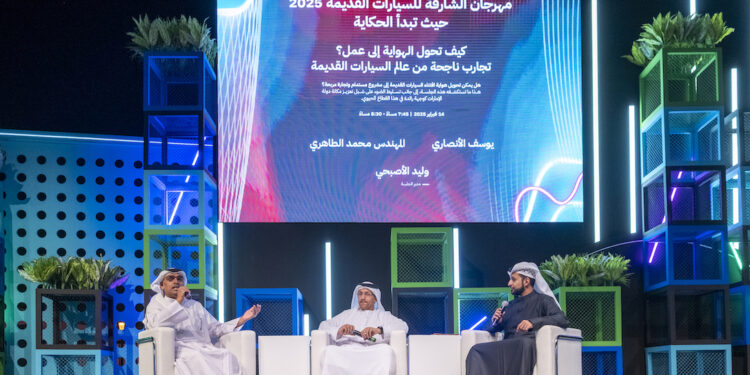The Sharjah Classic Car Festival 2025 continued on Friday, drawing large crowds with an
exciting lineup of discussions that provided practical insights and a deeper look into the evolving
world of classic cars. The festival’s panels explored how hobbyists can build successful
businesses and how modifications impact classic car values.
The evening started with a panel discussion titled “How to Turn a Hobby into a Business?
Successful Stories from the Classic Car World,” featuring Engineer Mohammed Al Dhaeri
and Yousef Al Ansari. The two experts discussed how passion for classic cars can be translated
into a sustainable business model, offering tips on identifying opportunities in a growing market.
Al Ansari shared his journey from enthusiast to industry professional, highlighting that turning a
passion into a business requires a deep understanding of the market, assessing demand for
different models, and sourcing the right parts. His journey began in 1997 with a 1989 Camaro
RS, which sparked his interest in classic cars, particularly American and Japanese models.
He emphasised that professionalism in the classic car industry requires objectivity, ensuring that
work is not limited to personal preferences for specific models. He warned against
misinformation regarding vehicles or maintenance, which could result in substantial financial
losses or negatively impact performance.
Regarding his transition into a successful business, Al Ansari explained that he established a
company dedicated to car cooling systems, focusing on radiators and fans. He began with
small-scale experiments and progressively honed his expertise, using cheap small cars as test
models to deepen his technical knowledge.
For his part, Al Dhaeri detailed his journey from a deep passion for classic cars to a professional
specialisation in Mercedes mechanics. His dedication to the brand led him to focus exclusively
on Mercedes, particularly due to its pioneering role in introducing hydraulic suspension systems
in 1963.He emphasised that training courses were pivotal in his career, enabling him to refine his skills
through specialised workshops and hands-on experience with industry professionals. He also
spent two years working part-time with a car dealership, gaining valuable insights from experts.
Concluding his remarks, he highlighted how he transformed his private garage into a fully
equipped workshop, allowing him to apply his expertise and provide high-quality services to
classic car enthusiasts. He stressed that success in this field demands ongoing passion,
specialised training, and continuous learning from experienced professionals.
Cars and Poetry
In the second session titled, “Cars and Poetry,” H.E. Fahad Al Mamari, Chairman of the
Emirates Library and Information Association, and H.E. Dr. Abdulaziz Al Musallam, Chairman of
the Sharjah Institute for Heritage, highlighted how classic cars have inspired poetry and
storytelling and become an integral part of heritage and artistic expression.
Al Mamari highlighted how cars became a literary and poetic symbol in the UAE from the 1950s
to the 1980s. He said Emirati poets documented car brands and colours, often linking luxury
vehicles to social status. Some poems, like one by the late Mohammed bin Suqat, even wove
cars into romantic narratives, showcasing their role beyond transportation.
For his part, Al Musallam traced the UAE’s automotive history, noting the first car's arrival in
Sharjah during the rule of Sheikh Sultan bin Saqr Al Qasimi II. He said that early Ford models
played a key role in daily life, such as transporting water. He also highlighted how poetry
reflected the shift from traditional transport to modern vehicles, with poets depicting the rivalry
between cars and camels, keeping classic cars embedded in cultural expression.
Running until February 17, the festival welcomes visitors daily from 4:00 PM to 10:00 PM. For
the latest updates and the full event programme, follow the Sharjah Old Cars Club on social
media: @shjocc.

































